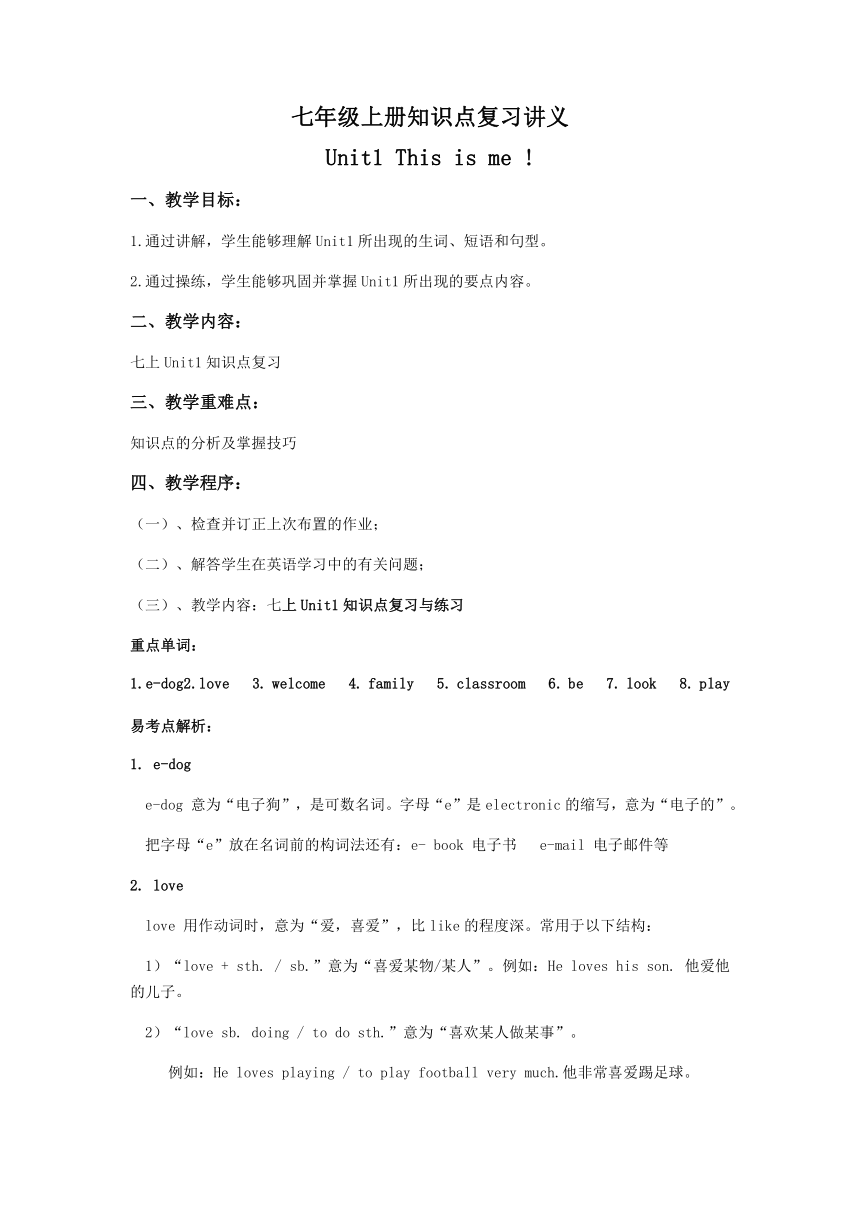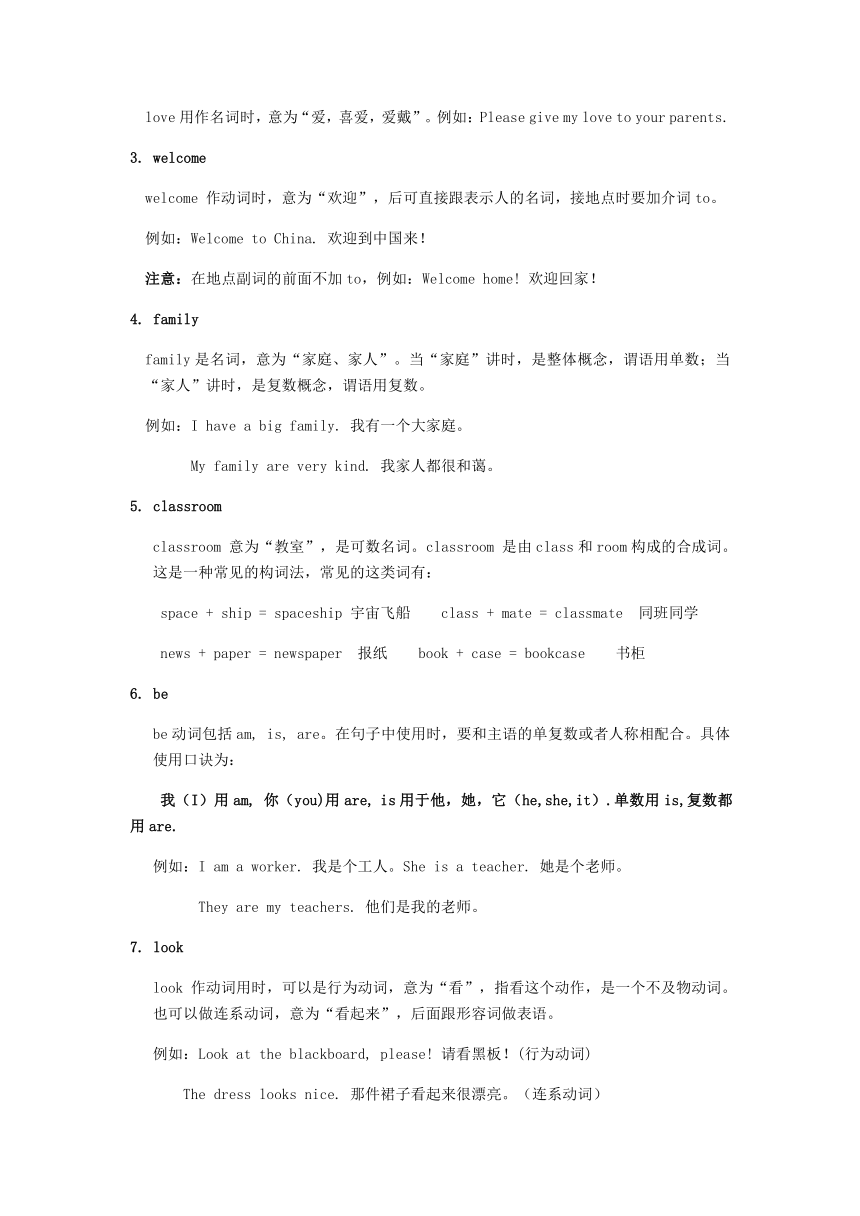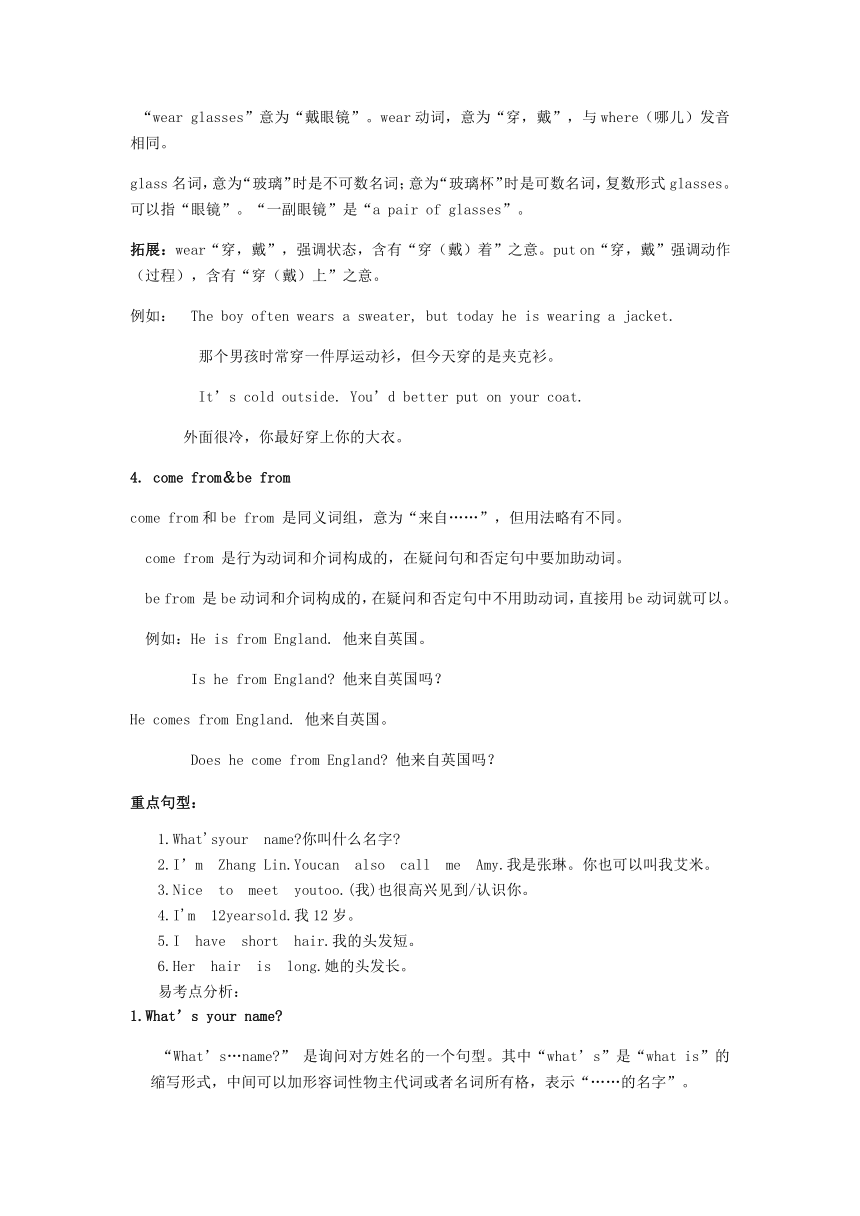Unit 1 This is me知识点复习讲义
文档属性
| 名称 | Unit 1 This is me知识点复习讲义 |

|
|
| 格式 | docx | ||
| 文件大小 | 708.7KB | ||
| 资源类型 | 教案 | ||
| 版本资源 | 牛津译林版 | ||
| 科目 | 英语 | ||
| 更新时间 | 2023-10-19 00:00:00 | ||
图片预览




文档简介
七年级上册知识点复习讲义
Unit1 This is me !
一、教学目标:
1.通过讲解,学生能够理解Unit1所出现的生词、短语和句型。
2.通过操练,学生能够巩固并掌握Unit1所出现的要点内容。
二、教学内容:
七上Unit1知识点复习
三、教学重难点:
知识点的分析及掌握技巧
四、教学程序:
(一)、检查并订正上次布置的作业;
(二)、解答学生在英语学习中的有关问题;
(三)、教学内容:七上Unit1知识点复习与练习
重点单词:
1.e-dog2.love 3. welcome 4. family 5. classroom 6. be 7. look 8. play
易考点解析:
1. e-dog
e-dog 意为“电子狗”,是可数名词。字母“e”是electronic的缩写,意为“电子的”。
把字母“e”放在名词前的构词法还有:e- book 电子书 e-mail 电子邮件等
2. love
love 用作动词时,意为“爱,喜爱”,比like的程度深。常用于以下结构:
1)“love + sth. / sb.”意为“喜爱某物/某人”。例如:He loves his son. 他爱他的儿子。
2)“love sb. doing / to do sth.”意为“喜欢某人做某事”。
例如:He loves playing / to play football very much.他非常喜爱踢足球。
love用作名词时,意为“爱,喜爱,爱戴”。例如:Please give my love to your parents.
3. welcome
welcome 作动词时,意为“欢迎”,后可直接跟表示人的名词,接地点时要加介词to。
例如:Welcome to China. 欢迎到中国来!
注意:在地点副词的前面不加to,例如:Welcome home! 欢迎回家!
4. family
family是名词,意为“家庭、家人”。当“家庭”讲时,是整体概念,谓语用单数;当“家人”讲时,是复数概念,谓语用复数。
例如:I have a big family. 我有一个大家庭。
My family are very kind. 我家人都很和蔼。
5. classroom
classroom 意为“教室”,是可数名词。classroom 是由class和room构成的合成词。这是一种常见的构词法,常见的这类词有:
space + ship = spaceship 宇宙飞船 class + mate = classmate 同班同学
news + paper = newspaper 报纸 book + case = bookcase 书柜
6. be
be动词包括am, is, are。在句子中使用时,要和主语的单复数或者人称相配合。具体使用口诀为:
我(I)用am, 你(you)用are, is用于他,她,它(he,she,it).单数用is,复数都用are.
例如:I am a worker. 我是个工人。She is a teacher. 她是个老师。
They are my teachers. 他们是我的老师。
7. look
look 作动词用时,可以是行为动词,意为“看”,指看这个动作,是一个不及物动词。也可以做连系动词,意为“看起来”,后面跟形容词做表语。
例如:Look at the blackboard, please! 请看黑板!(行为动词)
The dress looks nice. 那件裙子看起来很漂亮。(连系动词)
look还可以做名词,用于一些词组中。例如: have a look 看一看
8. play
play可以用作及物动词,意为“打,踢,拉,弹(乐器)”。如:
Can you play football 你会踢足球吗?
注意:play和球类名词连用时,名词前不加任何冠词,但用在乐器名词前应加定冠词the。
例如:He can play the piano. 他会弹钢琴。
She playsvolleyball every day. 她每天都打排球。
重点短语:
Look after 照顾、照料 be good at 擅长...
wear glasses 戴眼镜 come from... 来自于...
like sports喜欢运动 play football踢足球
after school放学后 tall and slim又高又苗条
易考点解析:
1. look after
look after 是动词短语,意为“照顾、照料”, 后接名词或者代词做宾语。
例如:Please look after the little boy. 请照顾一下这个小孩儿。
look after 常与词组take care of 互换,但是表示“保管”常用take care of。
例如:You must look after the cat. = You must take care of the cat.
你必须照顾这只猫。
2. be good at
be good at 意为“擅长……”, at是介词,后面可以接名词、代词或动名词。
例如:I’m good at English. 我擅长英语。
Jack is good at playing football. 杰克擅长踢足球。
拓展:be good at 相当于词组do well in,在句子中常可以互换。
例如: She is good at English. = She does well in English. 她擅长英语。
3. wear glasses
“wear glasses”意为“戴眼镜”。wear动词,意为“穿,戴”,与where(哪儿)发音相同。
glass名词,意为“玻璃”时是不可数名词;意为“玻璃杯”时是可数名词,复数形式glasses。可以指“眼镜”。“一副眼镜”是“a pair of glasses”。
拓展:wear“穿,戴”,强调状态,含有“穿(戴)着”之意。put on“穿,戴”强调动作(过程),含有“穿(戴)上”之意。
例如: The boy often wears a sweater, but today he is wearing a jacket.
那个男孩时常穿一件厚运动衫,但今天穿的是夹克衫。
It’s cold outside. You’d better put on your coat.
外面很冷,你最好穿上你的大衣。
4. come from&be from
come from和be from 是同义词组,意为“来自……”,但用法略有不同。
come from 是行为动词和介词构成的,在疑问句和否定句中要加助动词。
be from 是be动词和介词构成的,在疑问和否定句中不用助动词,直接用be动词就可以。
例如:He is from England. 他来自英国。
Is he from England 他来自英国吗?
He comes from England. 他来自英国。
Does he come from England 他来自英国吗?
重点句型:
1.What'syour name 你叫什么名字
2.I’m Zhang Lin.Youcan also call me Amy.我是张琳。你也可以叫我艾米。
3.Nice to meet youtoo.(我)也很高兴见到/认识你。
4.I'm 12yearsold.我12岁。
5.I have short hair.我的头发短。
6.Her hair is long.她的头发长。
易考点分析:
1.What’s your name
“What’s…name ” 是询问对方姓名的一个句型。其中“what’s”是“what is”的缩写形式,中间可以加形容词性物主代词或者名词所有格,表示“……的名字”。
例如:What’s her name 她叫什么名字?
What’s your sister’s name 你姐姐叫什么名字?
注意:该句型经常用于入学报名的时候老师问学生;求职的时候老板问员工等正式场合。如果初次见面这样问是不礼貌的,如果是非问不可的情况下尽量使用委婉和客气的语气来询问。
例如:What’s your name, please
或者直接用:Your name, please 请问你的名字是?
读的时候用升调,比直接用“What’s your name ”更客气。
拓展:初次见面时还可以互相说:“How do you do ”。意为“你好”。
2.I’m Amy.
句式“I’m +名字”或“My name’s+名字”,是同义句,意为“我的名字是……”。用来回答“What’s your name?”。 “name’s”是“name is”的缩写。
句中的人称代词“I”或者形容词性物主代词“my”,可以根据问句的情况换成相应的词。
例如:-What’s your name 你叫什么名字?
-My name’s Mary. = I’m Mary. 我叫Mary。
-What’s her name 她叫什么名字?
-Her name’s Lily.= She’s Lily. 她的名字叫Lily。
3.Nice to meet you.
这是一个用于初次见面的有礼貌的问候语,它的回答用“Nice to meet you, too.”,表示“见到你也很高兴”的意思。经常用在两个人初次见面或者经别人介绍后认识时,表示一种礼节。
这个句子经常用在下面情景中:
例如:Tom:Hi, Jim. This is Li Lei. 吉姆你好。这是李蕾。
Jim: Hello, Li Lei! Nice to meet you! 李蕾你好!见到你很高兴。
Li Lei: Hello, Jim! Nice to meet you, too. 吉姆你好!见到你也很高兴。
注意:本句式中的“nice”可以换成“glad/pleased”等; 此外,句中的动词“meet” 可以换成“see”。
例如:Glad to meet/see you. = Pleased to meet / see you. = Nice to meet/ see you.
见到你很高兴。
4. I'm 12yearsold.我12岁。
解析:本句的意思是“我12岁。”;句式:“主语+be+数字+year(s) old”表示“某人几岁了”。也可以用“主语+be+数字”表示。如果年龄超过一岁,则year用复数形式。
例如:The boy is six years old. 这个男孩6岁了。
She is 18. 她18岁了。
拓展:就年龄提问用“How old + are/is+主语?”
— How old are you 你几岁了?
— I am twelve years old. 我12岁了。
— How old is the boy 这个男孩多大了?
— He isten years old. 他10岁了。
重点语法
一般现在时:表示经常性、习惯性的动作或状态以及客观真理、格言等不受时间限
制的客观存在。
be动词在一般现在时里有三种形式:am、is、are。注意它们与不同主语的搭配使用。
口诀:我(I)用am, 你(you)用are, is用于他,她,它(he,she,it).单数用is,复数都用are.
课堂练习
(一)、根据句意和首字母提示写出句中所缺单词。
1. Tony is my c_________. We are in Class 1.
2. Our teacher is n______ to us.
3. Kitty is tall and s________.
4. My hair is s_______, but my sister’s is long.
5. The boys like p______ football after school.
6. Tom likes r_______ very much. He has lot of books.
7. -W_______ to our school!-Thank you!
8. Let’s m_______ our new friends, Sandy and Millie.
9. Our c_________ is big and clean.
10. I have an e-_______. Its name is Hobo.
(二)、用所给词的适当形式填空。
1. Let’s______ (meet) my new friends.
2. I don’t know how______ (look) after my cat.
3. Sandy is good at _______ (swim).
4. Millie _______ (like) sports very much.
5. The boys love ______ (read).
6. I’m 16 ______ (year) old.
7. _____(be)you from China
8. What ______ (be) her name
9. Their family ______ (be) very friendly(友好的).
10. The girl ______ (look) nice in the skirt.
(三)、句型转换,每空一词。
1. My name is Kate.(对划线部分提问) is name
2. I'm Jenny. (改为同义句) _______ ______ is Jenny.
3. Jim is fine. (对划线部分提问) _______ ______ Jim
4. Jack is at school now. (改为否定句)Jack ______ ______ at school.
5. She is from England. (改为同义句)She ______ ______ England.
6. He does well in English. (改为同义句)He ______ ______ ______ English.
7. His hair is long. (同义句)_______ ______ long hair.
8. Nice to meet you! (同义句)______ to _____ you!
9. I’m 15 years old. (对划线部分提问)______ ______ are you
10. I’m from England. (对划线部分提问)______ ______ you from
(四)、阅读理解
We each have a memory (记忆力). That’s why we can still remember(记得) things after a long time. Some people have very good memories and they can easily learn many things by heart, but some people can only remember things when they say or do them again and again. Many of the great men of the world have got surprising(令人惊讶的) memories.
A good memory is a great help in learning a language. Everybody learns his mother language when he is a small child. He hears the sounds, remembers them and then he learns to speak. Some children are living with their parents in foreign countries. They can learn two languages as easily as one because they hear, remember and speak two languages every day. In school it is not so easy to learn a foreign language because the pupils have so little time for it, and they are busy with other subjects, too.
But your memory will become better and better when you do more and more exercises.
( ) 1. Some people can easily learn many things by heart because _____________.
A .they always sleep very well B. they often eat good food
C. they read a lot of books D. they have very good memories
( ) 2. Everybody learns his mother language _____________.
A. at the age of six B. when he is a small child
C. after he goes to school D. when he can read and write
( ) 3. Before a child can speak, he must _____________.
A.read and write B. make sentences
C. hear and remember the sounds D. think hard
( ) 4. In school the pupils can’t learn a foreign language well because _____________.
A. they have no good memories B. they have no recorders
C. they have too much time for it D. they are busy with other subjects
( ) 5. Your memory will become better and better _____________.
A. if you have plenty of good food B. if you do more and more exercises
C. if you do morning exercises every day D. if you get up early
Unit1 This is me !
一、教学目标:
1.通过讲解,学生能够理解Unit1所出现的生词、短语和句型。
2.通过操练,学生能够巩固并掌握Unit1所出现的要点内容。
二、教学内容:
七上Unit1知识点复习
三、教学重难点:
知识点的分析及掌握技巧
四、教学程序:
(一)、检查并订正上次布置的作业;
(二)、解答学生在英语学习中的有关问题;
(三)、教学内容:七上Unit1知识点复习与练习
重点单词:
1.e-dog2.love 3. welcome 4. family 5. classroom 6. be 7. look 8. play
易考点解析:
1. e-dog
e-dog 意为“电子狗”,是可数名词。字母“e”是electronic的缩写,意为“电子的”。
把字母“e”放在名词前的构词法还有:e- book 电子书 e-mail 电子邮件等
2. love
love 用作动词时,意为“爱,喜爱”,比like的程度深。常用于以下结构:
1)“love + sth. / sb.”意为“喜爱某物/某人”。例如:He loves his son. 他爱他的儿子。
2)“love sb. doing / to do sth.”意为“喜欢某人做某事”。
例如:He loves playing / to play football very much.他非常喜爱踢足球。
love用作名词时,意为“爱,喜爱,爱戴”。例如:Please give my love to your parents.
3. welcome
welcome 作动词时,意为“欢迎”,后可直接跟表示人的名词,接地点时要加介词to。
例如:Welcome to China. 欢迎到中国来!
注意:在地点副词的前面不加to,例如:Welcome home! 欢迎回家!
4. family
family是名词,意为“家庭、家人”。当“家庭”讲时,是整体概念,谓语用单数;当“家人”讲时,是复数概念,谓语用复数。
例如:I have a big family. 我有一个大家庭。
My family are very kind. 我家人都很和蔼。
5. classroom
classroom 意为“教室”,是可数名词。classroom 是由class和room构成的合成词。这是一种常见的构词法,常见的这类词有:
space + ship = spaceship 宇宙飞船 class + mate = classmate 同班同学
news + paper = newspaper 报纸 book + case = bookcase 书柜
6. be
be动词包括am, is, are。在句子中使用时,要和主语的单复数或者人称相配合。具体使用口诀为:
我(I)用am, 你(you)用are, is用于他,她,它(he,she,it).单数用is,复数都用are.
例如:I am a worker. 我是个工人。She is a teacher. 她是个老师。
They are my teachers. 他们是我的老师。
7. look
look 作动词用时,可以是行为动词,意为“看”,指看这个动作,是一个不及物动词。也可以做连系动词,意为“看起来”,后面跟形容词做表语。
例如:Look at the blackboard, please! 请看黑板!(行为动词)
The dress looks nice. 那件裙子看起来很漂亮。(连系动词)
look还可以做名词,用于一些词组中。例如: have a look 看一看
8. play
play可以用作及物动词,意为“打,踢,拉,弹(乐器)”。如:
Can you play football 你会踢足球吗?
注意:play和球类名词连用时,名词前不加任何冠词,但用在乐器名词前应加定冠词the。
例如:He can play the piano. 他会弹钢琴。
She playsvolleyball every day. 她每天都打排球。
重点短语:
Look after 照顾、照料 be good at 擅长...
wear glasses 戴眼镜 come from... 来自于...
like sports喜欢运动 play football踢足球
after school放学后 tall and slim又高又苗条
易考点解析:
1. look after
look after 是动词短语,意为“照顾、照料”, 后接名词或者代词做宾语。
例如:Please look after the little boy. 请照顾一下这个小孩儿。
look after 常与词组take care of 互换,但是表示“保管”常用take care of。
例如:You must look after the cat. = You must take care of the cat.
你必须照顾这只猫。
2. be good at
be good at 意为“擅长……”, at是介词,后面可以接名词、代词或动名词。
例如:I’m good at English. 我擅长英语。
Jack is good at playing football. 杰克擅长踢足球。
拓展:be good at 相当于词组do well in,在句子中常可以互换。
例如: She is good at English. = She does well in English. 她擅长英语。
3. wear glasses
“wear glasses”意为“戴眼镜”。wear动词,意为“穿,戴”,与where(哪儿)发音相同。
glass名词,意为“玻璃”时是不可数名词;意为“玻璃杯”时是可数名词,复数形式glasses。可以指“眼镜”。“一副眼镜”是“a pair of glasses”。
拓展:wear“穿,戴”,强调状态,含有“穿(戴)着”之意。put on“穿,戴”强调动作(过程),含有“穿(戴)上”之意。
例如: The boy often wears a sweater, but today he is wearing a jacket.
那个男孩时常穿一件厚运动衫,但今天穿的是夹克衫。
It’s cold outside. You’d better put on your coat.
外面很冷,你最好穿上你的大衣。
4. come from&be from
come from和be from 是同义词组,意为“来自……”,但用法略有不同。
come from 是行为动词和介词构成的,在疑问句和否定句中要加助动词。
be from 是be动词和介词构成的,在疑问和否定句中不用助动词,直接用be动词就可以。
例如:He is from England. 他来自英国。
Is he from England 他来自英国吗?
He comes from England. 他来自英国。
Does he come from England 他来自英国吗?
重点句型:
1.What'syour name 你叫什么名字
2.I’m Zhang Lin.Youcan also call me Amy.我是张琳。你也可以叫我艾米。
3.Nice to meet youtoo.(我)也很高兴见到/认识你。
4.I'm 12yearsold.我12岁。
5.I have short hair.我的头发短。
6.Her hair is long.她的头发长。
易考点分析:
1.What’s your name
“What’s…name ” 是询问对方姓名的一个句型。其中“what’s”是“what is”的缩写形式,中间可以加形容词性物主代词或者名词所有格,表示“……的名字”。
例如:What’s her name 她叫什么名字?
What’s your sister’s name 你姐姐叫什么名字?
注意:该句型经常用于入学报名的时候老师问学生;求职的时候老板问员工等正式场合。如果初次见面这样问是不礼貌的,如果是非问不可的情况下尽量使用委婉和客气的语气来询问。
例如:What’s your name, please
或者直接用:Your name, please 请问你的名字是?
读的时候用升调,比直接用“What’s your name ”更客气。
拓展:初次见面时还可以互相说:“How do you do ”。意为“你好”。
2.I’m Amy.
句式“I’m +名字”或“My name’s+名字”,是同义句,意为“我的名字是……”。用来回答“What’s your name?”。 “name’s”是“name is”的缩写。
句中的人称代词“I”或者形容词性物主代词“my”,可以根据问句的情况换成相应的词。
例如:-What’s your name 你叫什么名字?
-My name’s Mary. = I’m Mary. 我叫Mary。
-What’s her name 她叫什么名字?
-Her name’s Lily.= She’s Lily. 她的名字叫Lily。
3.Nice to meet you.
这是一个用于初次见面的有礼貌的问候语,它的回答用“Nice to meet you, too.”,表示“见到你也很高兴”的意思。经常用在两个人初次见面或者经别人介绍后认识时,表示一种礼节。
这个句子经常用在下面情景中:
例如:Tom:Hi, Jim. This is Li Lei. 吉姆你好。这是李蕾。
Jim: Hello, Li Lei! Nice to meet you! 李蕾你好!见到你很高兴。
Li Lei: Hello, Jim! Nice to meet you, too. 吉姆你好!见到你也很高兴。
注意:本句式中的“nice”可以换成“glad/pleased”等; 此外,句中的动词“meet” 可以换成“see”。
例如:Glad to meet/see you. = Pleased to meet / see you. = Nice to meet/ see you.
见到你很高兴。
4. I'm 12yearsold.我12岁。
解析:本句的意思是“我12岁。”;句式:“主语+be+数字+year(s) old”表示“某人几岁了”。也可以用“主语+be+数字”表示。如果年龄超过一岁,则year用复数形式。
例如:The boy is six years old. 这个男孩6岁了。
She is 18. 她18岁了。
拓展:就年龄提问用“How old + are/is+主语?”
— How old are you 你几岁了?
— I am twelve years old. 我12岁了。
— How old is the boy 这个男孩多大了?
— He isten years old. 他10岁了。
重点语法
一般现在时:表示经常性、习惯性的动作或状态以及客观真理、格言等不受时间限
制的客观存在。
be动词在一般现在时里有三种形式:am、is、are。注意它们与不同主语的搭配使用。
口诀:我(I)用am, 你(you)用are, is用于他,她,它(he,she,it).单数用is,复数都用are.
课堂练习
(一)、根据句意和首字母提示写出句中所缺单词。
1. Tony is my c_________. We are in Class 1.
2. Our teacher is n______ to us.
3. Kitty is tall and s________.
4. My hair is s_______, but my sister’s is long.
5. The boys like p______ football after school.
6. Tom likes r_______ very much. He has lot of books.
7. -W_______ to our school!-Thank you!
8. Let’s m_______ our new friends, Sandy and Millie.
9. Our c_________ is big and clean.
10. I have an e-_______. Its name is Hobo.
(二)、用所给词的适当形式填空。
1. Let’s______ (meet) my new friends.
2. I don’t know how______ (look) after my cat.
3. Sandy is good at _______ (swim).
4. Millie _______ (like) sports very much.
5. The boys love ______ (read).
6. I’m 16 ______ (year) old.
7. _____(be)you from China
8. What ______ (be) her name
9. Their family ______ (be) very friendly(友好的).
10. The girl ______ (look) nice in the skirt.
(三)、句型转换,每空一词。
1. My name is Kate.(对划线部分提问) is name
2. I'm Jenny. (改为同义句) _______ ______ is Jenny.
3. Jim is fine. (对划线部分提问) _______ ______ Jim
4. Jack is at school now. (改为否定句)Jack ______ ______ at school.
5. She is from England. (改为同义句)She ______ ______ England.
6. He does well in English. (改为同义句)He ______ ______ ______ English.
7. His hair is long. (同义句)_______ ______ long hair.
8. Nice to meet you! (同义句)______ to _____ you!
9. I’m 15 years old. (对划线部分提问)______ ______ are you
10. I’m from England. (对划线部分提问)______ ______ you from
(四)、阅读理解
We each have a memory (记忆力). That’s why we can still remember(记得) things after a long time. Some people have very good memories and they can easily learn many things by heart, but some people can only remember things when they say or do them again and again. Many of the great men of the world have got surprising(令人惊讶的) memories.
A good memory is a great help in learning a language. Everybody learns his mother language when he is a small child. He hears the sounds, remembers them and then he learns to speak. Some children are living with their parents in foreign countries. They can learn two languages as easily as one because they hear, remember and speak two languages every day. In school it is not so easy to learn a foreign language because the pupils have so little time for it, and they are busy with other subjects, too.
But your memory will become better and better when you do more and more exercises.
( ) 1. Some people can easily learn many things by heart because _____________.
A .they always sleep very well B. they often eat good food
C. they read a lot of books D. they have very good memories
( ) 2. Everybody learns his mother language _____________.
A. at the age of six B. when he is a small child
C. after he goes to school D. when he can read and write
( ) 3. Before a child can speak, he must _____________.
A.read and write B. make sentences
C. hear and remember the sounds D. think hard
( ) 4. In school the pupils can’t learn a foreign language well because _____________.
A. they have no good memories B. they have no recorders
C. they have too much time for it D. they are busy with other subjects
( ) 5. Your memory will become better and better _____________.
A. if you have plenty of good food B. if you do more and more exercises
C. if you do morning exercises every day D. if you get up early
同课章节目录
- 预备课程
- Lesson 1 Nice to meet you !
- Lesson 2 A happy family
- Lesson 3 A nice school
- Lesson 4 You look cool !
- Lesson 5 Wonderful things
- Lesson 6 Have nice food
- Lesson 7 Enjoy our days
- Lesson 8 Let's have fun !
- Unit 1 This is me
- Unit 2 Let's play sports
- Unit 3 Welcome to our school
- Unit 4 My day
- Unit 5 Let’s celebrate
- Unit 6 Food and lifestyle
- Unit 7 Shopping
- Unit 8 Fashion
